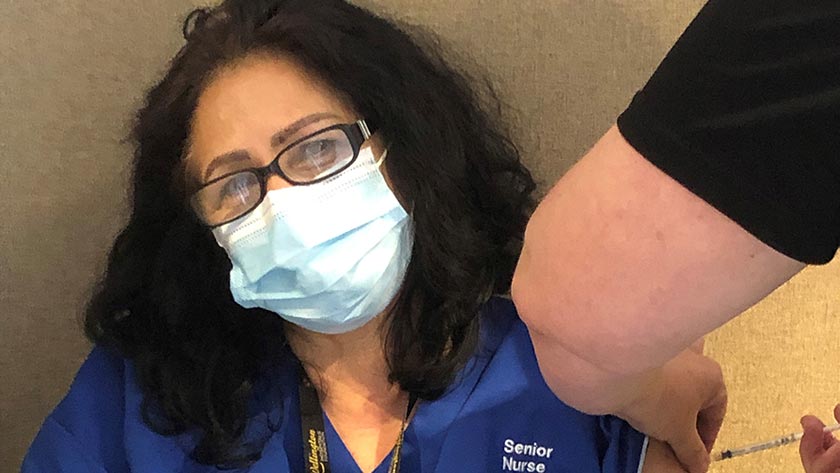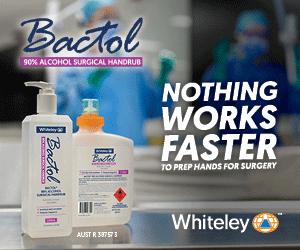Wellington infection, prevention & control (IPC) clinical nurse specialist (CNS) Karen Corban (Ngāti Porou) has felt the pressure over the past year, with demand for her expertise growing phenomenally with the arrival of COVID-19. “We were needed in 50 different ways,” says Corban, a member of NZNO’s IPC Nurses College.
Anxiety levels among colleagues have been high. It has taken time to reassure, communicate and train staff on the correct use of personal protective equipment (PPE) and other IPC processes. “We had to train the trainers – the DoNs [directors of nursing] and senior staff across the hospital,” said Corban, who works at Capital & Coast District Health Board (C&CDHB).
And while she’s an experienced IPC nurse, with a master’s degree in public health from the University of Otago and IPC qualification from Waiariki (now Toi Ohomai), the scale of COVID-19 preparations has been “huge” compared to anything previously encountered.
For weeks in early 2020, she worked up to 12-hour days, looking to the latest international advice from the Centers for Disease Control and Prevention and the World Health Organization, as well as the Ministry of Health, in a fast-changing scene.
Corban worked with primary health IPC colleague Barbara Vardey to check IPC processes at Newtown School’s community-based assessment centre (CBACs). That involved training dozens of nurses to correctly carry out a nasal – or “nasopharyngeal” – swab and don and doff PPE (“the amount of times people videoed it so they could remember it safely”), as well as check “flow” through the testing centres.
Amid all that, Corban and Vardey were also asked to scope out possibilities for other CBAC sites in central Wellington, in case of a community outbreak.
She also oversaw the IPC processes at COVID-19 assessment and management units (CAMU), at Wellington Regional Hospital. These assessed patients who had been referred with suspected or known COVID-19 and who possibly required admission.
Through April and May, Corban and her C&CDHB IPC team also provided IPC support to about 45 aged residential care (ARC) facilities in the Wellington region.
In May and June, she helped set up IPC processes at Wellington’s QT Hotel, where several international crew from the Avatar movie had flown in from the COVID-19 ravaged United States. That involved organising safe processes for PPE, cleaning, housekeeping, waste, food delivery – “just keeping everyone safe”.
Complaints crew members were not distanced from other guests when checking in, drew media coverage. Corban said safe systems were in place, but it appeared the social distancing rules were not applied.
Also in June, Corban was tasked with setting up a managed isolation and quarantine facility (MIQ) at Wellington’s Grand Mercure Hotel, in two days. “I got a phone call on Monday [June 24] and got asked to set up IPC processes at the Grand Mercure to be ready by Friday [June 26] for 96 people arriving,” Corban said. “Everything was just evolving very quickly, so basically I set up hotel processes, from cleaning to entry flow, to swabbing processes.”
Nurses practised taking nasal swabs on police and defence staff, “because some of them had never done it”.
The MIQ team had to inform Te Aro School, across the road, and parents, whose concern sparked media coverage. But on day one, students and families greeted returnees from South Korea with welcoming placards and laminated stars. “When the group left they gifted a generous koha to us – we gave it to the school. It was just so moving.”
She worked 18 days in a row over that period, as she felt it was important to be there as much as possible, answering questions and ensuring the system was safe. “It was certainly a baptism of fire.” But she had really good support from IPC colleagues in NZNO’s college and the DHB.
Since the initial rush, the team had set up better cultural supports at both the Mercure, and Bay Plaza Hotel, now an isolation facility. These included opportunities for face-to-face video chats with whānau and te reo Māori resources and advice, along with Pacific and other languages. “It took a while to have these resources available in different languages.”
As a Māori nurse, Corban says she was often asked to check in with Māori returnees. “Sometimes they just want to see another Māori – sometimes I was asked to go in and do a health check.”
“It’s about connection and that’s really important. It seems to calm people down and they are less anxious.”
Corban began her working life as a cardio-thoracic nurse in Auckland, working in the Waikato then London, before taking up a cardiology charge nurse role at a private hospital in Wellington. She worked in IPC in mental health services for a while, before taking up her current role at C&CDHB in 2016.
She found she “absolutely” loved the meticulousness required by the role.
Over her 35-year career, Corban has experienced frustration at getting the message through during smaller epidemics, such as the 2019/20 measles outbreak in Auckland. But these days, it was gratifying to see people really paying attention to IPC and hygiene practices. “People take notice when there is an outbreak – and never more so than now.”





